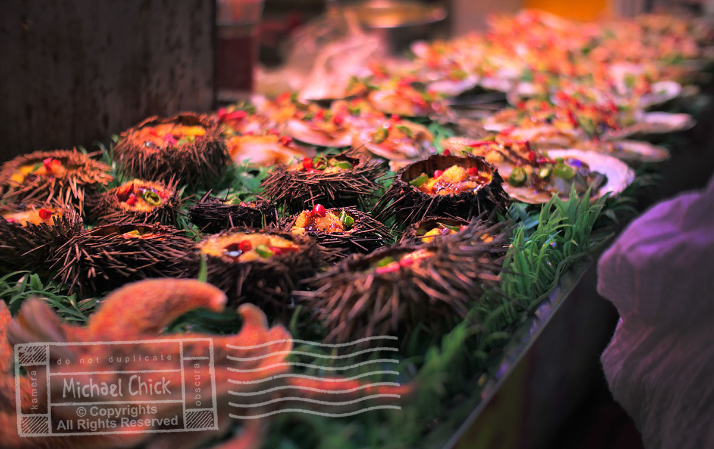| Lifestyle |
| Night Owls' Market | |
| A malaysian's life in Beijing proves a wonderful experience | |
|
|
 Seafoods are sold at a night market in Qingdao, east China's Shandong Province (MICHAEL CHICK)
After living in Bangkok for over eight years, moving to Beijing turned out to be a drastically different experience. Everything felt different, the climate, the sights, the sounds and even the smells. Sure, Bangkok boasts the largest Chinatown on the planet, but Chinatown-Bangkok and China are simply not the same. Beyond the obvious language difference and Thailand's legendary street food, Beijing lacked something else. It took a while to realize what it was—a night market for locals. The Qianmen, Wangfujing and Nanluoguxiang night markets fall into the "commercial tourist destination" category, rather than a night market a local would go to. Perhaps Beijing's cold weather has something to do with the absence of such a night market. And perhaps Bangkok's year-round tropical weather makes such night markets a hit. On consulting colleagues, the standard answer was, "If you want to buy something, get it onTaobao.com, JD.com or Tmall.com." I became resigned to the fact that such a market did not exist in Beijing. Then I made a trip to Qingdao, a coast city in east China's Shandong Province that is some five hours south of Beijing by high-speed train. The hotel receptionist suggested I try the Taidong Night Market on Taidong Third Road. My heart skipped a beat. "Seriously? A night market here in Qingdao?" I asked. A nonchalant nod and a broad smile confirmed that it was in fact true. She kindly helped type the address for me into my DiDi app, a ride-hailing service, and the taxi promptly arrived in a few minutes. I'm not sure which was louder, Teresa Teng blaring in the taxi, or my thumping heart, throbbing with unbridled excitement. When the taxi finally stopped, I hurriedly opened the door, and before me was the Taidong Night Market in all its splendor. This sprawling 500-meter night market is located practically in the same neighborhood as the famous Tsingtao Brewery Museum, a mere 700 meters away to the northeast of the iconic landmark. In fact, it shares the same street, which mysteriously changes its name from Dengzhou Road to Weihai Road at the bend. Arranged in neat rows, the night market has two distinct sections, converging somewhere near Walmart. In the north section, the wafting aroma of fried, boiled, baked, broiled and braised food alone is enough to delight any gastronomist. Being a port city, Qingdao's proximity to the sea provides a ready stream of seafood, ranging from grilled fish, shrimp, crayfish and sea urchins to the squid, literally "ink-fish" in Chinese. You can also find pastries of every shape, size and color, in addition to other Chinese culinary delights such as Sichuan, Cantonese, Shandong, Fujian, Uygur or hotpot. You name it, they have it. In addition to the food stalls, an armada of restaurants flanks the entire night market and beyond, serving both local and non-local cuisines. The usual suspects, including steaks, pizza, burgers, hotdogs, pastas and the like are but a short list of non-Chinese alternatives. They say the shortest way to a man's heart is through his stomach. If that be true, then this must have been the place where that phrase was coined. Alongside these food stalls are merchants who sell a plethora of other merchandise. From mundane cellphone accessories to the latest electronic gadgets, musical instruments, cooking pots, clothing, stationery, souvenirs, jewelry, cosmetics and makeup. It was interesting to note that not a single stall sold fake goods. Not a single counterfeit branded watch, handbag, purse, wallet, or belt was in sight. Kudos to the government for strict enforcement. I would highly recommend that you explore the surrounding area earlier in the day, as it is chock-full with shops and malls selling every imaginable bric-a-brac. Also within striking distance to the west are two IT malls. Items sold there are far cheaper than in Beijing. The general idea is to arrive at the night market circa 5:30 p.m., when it opens. It shutters at around 10 at night. By that time, the shopping crowd would have dwindled, leaving the restaurants and bars the only spots showing signs of human activity. I flagged a taxi on the Yan'an Third Road, and made my way back to my hotel, stomach filled and heart content that I finally managed to visit a night market in China. Would I return? Most definitely. The author is a Malaysian living in Beijing Copyedited by Sudeshna Sarkar Comments to dingying@bjreview.com |
|
||||||||||||||||||||||||||||
|